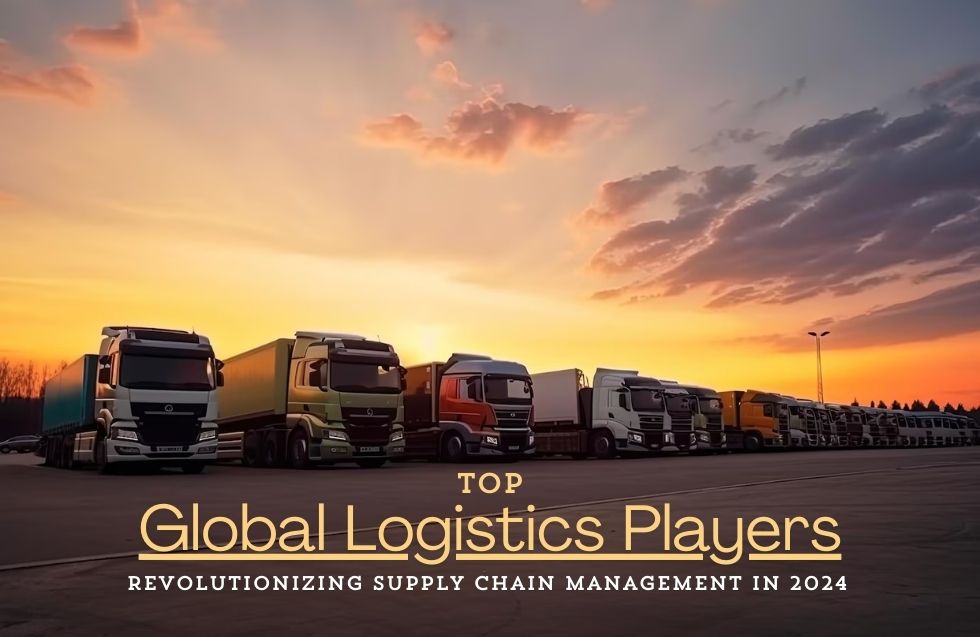In today’s interconnected global economy, logistics and supply chain management play a pivotal role in ensuring the efficient movement of goods across continents. Whether it’s delivering products to customers or transporting raw materials to factories, logistics companies are the backbone of commerce. Over the last few years, the logistics industry has undergone a remarkable transformation, driven by the rise of e-commerce, technological innovations, and growing consumer expectations for faster, more reliable deliveries.
In 2024, the leading global logistics players are not only navigating these changes but are also revolutionizing supply chain management by leveraging cutting-edge technologies, enhancing sustainability, and improving operational efficiency. This article highlights the top global logistics companies reshaping the industry, providing insights into their strategies, market dominance, and impact on the supply chain landscape.
1. DHL: A Global Leader in Sustainable Logistics
Deutsche Post DHL Group, commonly known as DHL, remains one of the most dominant logistics players globally. With operations in over 220 countries and territories, DHL offers a range of logistics services, including international shipping, warehousing, freight transportation, and supply chain management solutions.
Sustainability leadership: DHL has committed to reducing its carbon footprint through its ambitious “Mission 2050” goal of zero emissions by 2050. In 2022, DHL achieved significant progress by increasing its use of electric vehicles and expanding its fleet of sustainable aircraft. The company aims to electrify 60% of its last-mile delivery fleet by 2030. DHL’s investment in green logistics is setting a new standard for sustainability across the industry.
Technological innovations: DHL is a pioneer in adopting cutting-edge technology to improve supply chain efficiency. The company has heavily invested in automation and robotics to streamline warehouse operations, using AI-powered sorting systems and robotic arms to handle packages with speed and precision. DHL’s use of predictive analytics and blockchain technology has also enhanced its ability to track shipments in real time, reducing delays and improving transparency across its global supply chain.
According to the 2023 Armstrong & Associates report, DHL generated $90.2 billion in revenue, maintaining its position as the largest logistics company globally.
2. UPS: Redefining Last-Mile Delivery with Advanced Technology
United Parcel Service (UPS), headquartered in Atlanta, USA, is a global logistics powerhouse that specializes in package delivery, freight services, and supply chain management. UPS has become a leader in last-mile delivery, which refers to the final step of the delivery process, from a distribution center to the end customer.
AI and route optimization: UPS is using AI-driven algorithms to optimize delivery routes, enabling its drivers to take the most efficient routes and reduce fuel consumption. The company’s ORION (On-Road Integrated Optimization and Navigation) system, launched in 2013, has evolved significantly, saving UPS millions of miles in driving distance and cutting fuel use by more than 10 million gallons annually. In 2024, ORION continues to be a critical asset in reducing costs and improving delivery speed.
Sustainable logistics: Like DHL, UPS is also prioritizing sustainability. The company has set a goal to achieve carbon neutrality by 2050, and it is actively investing in electric vehicles, alternative fuel sources, and renewable energy. UPS’s Delivery Solutions division has also embraced carbon offsetting, allowing customers to neutralize the environmental impact of their shipments.
In 2023, UPS reported revenues of $100.3 billion, cementing its place as one of the top logistics players globally. With its focus on technology-driven innovations and sustainability, UPS is poised to continue leading in supply chain management in 2024.
3. FedEx: Leveraging Automation and E-commerce Growth
FedEx Corporation, a global leader in shipping and supply chain solutions, continues to revolutionize the logistics industry through its adoption of automation and focus on the booming e-commerce market. Headquartered in Memphis, Tennessee, FedEx operates one of the most expansive global transportation networks, delivering to over 220 countries and territories.
Automation and robotics: FedEx has been integrating automation and robotics into its supply chain to handle the increasing volume of
e-commerce shipments. The company has deployed sorting robots in its warehouses to sort and route packages more efficiently, reducing human error and speeding up the process. Its robotic arms, developed in collaboration with Boston Dynamics, handle packages in distribution centers, improving productivity.
E-commerce dominance: As e-commerce continues to grow at an unprecedented rate, FedEx has adapted by launching new services tailored to online retailers. In 2023, the company introduced FedEx SameDay City, a last-mile delivery service aimed at providing same-day delivery for e-commerce orders in urban areas. This service has become a key differentiator, enabling FedEx to compete more effectively with Amazon’s logistics arm.
FedEx’s revenue for 2023 was $97.6 billion, reflecting strong growth driven by e-commerce demand and innovation in delivery services.
4. Maersk: Transforming Global Trade with Integrated Supply Chain Solutions
A.P. Moller-Maersk, commonly referred to as Maersk, is the world’s largest container shipping company, responsible for moving approximately 20% of the world’s ocean freight. However, Maersk has evolved beyond shipping to become a full-service logistics provider, offering integrated supply chain management solutions.
Integrated logistics: In recent years, Maersk has aggressively expanded its capabilities in air freight, warehousing, and inland transportation, positioning itself as a one-stop shop for global trade. Maersk’s acquisition of LF Logistics in 2022 bolstered its presence in Asia and expanded its footprint in the e-commerce supply chain.
Digital transformation: Maersk has embraced digitalization to improve transparency and efficiency in global trade. The company’s TradeLens platform, developed in collaboration with IBM, uses blockchain technology to streamline the exchange of shipping documents and data between supply chain partners. This platform has significantly reduced paperwork and transaction times, enabling faster, more secure, and more transparent trade operations.
Maersk generated $81.5 billion in revenue in 2023, with its focus on integrated logistics and digital solutions positioning it as a key player in revolutionizing global supply chain management in 2024.
5. XPO Logistics: A Leader in Freight Brokerage and Last-Mile Services
A U.S.-based company, has gained recognition as one of the most innovative logistics providers globally, particularly in the areas of freight brokerage, last-mile delivery, and contract logistics. XPO operates in 30 countries and provides services to industries ranging from e-commerce and retail to manufacturing and automotive.
Freight brokerage dominance: XPO is a leader in freight brokerage, matching shippers with carriers to move goods across the country. The company has leveraged data analytics and machine learning to optimize carrier selection, pricing, and route planning. In 2023, XPO’s freight brokerage division facilitated the movement of over 12 million shipments, making it one of the largest brokers in the U.S.
Last-mile innovation: XPO is also a leader in last-mile delivery, particularly for large, bulky items such as appliances and furniture. In 2024, the company continues to invest in its last-mile technology platform, which integrates delivery tracking, inventory management, and real-time communication with customers, enhancing the delivery experience.
In 2023, XPO Logistics reported revenue of $12.5 billion, driven by strong growth in its freight brokerage and last-mile delivery services.
6. Amazon Logistics: The E-commerce Giant’s Growing Influence
While not a traditional logistics company, Amazon Logistics is rapidly becoming a force to be reckoned with in global supply chain management. Amazon’s vast logistics network includes fulfillment centers, delivery stations, and its own fleet of trucks, planes, and delivery vehicles.
Same-day and next-day delivery: Amazon’s dominance in e-commerce has been fueled by its Prime delivery service, which offers same-day and next-day delivery for millions of items. In 2023, Amazon announced plans to expand its fleet of electric delivery vans, further enhancing its commitment to sustainable logistics.
Automation in fulfillment centers: Amazon continues to lead in warehouse automation, using Kiva robots to move goods within its fulfillment centers, reducing labor costs and improving efficiency. Amazon’s ability to deliver products quickly and cost-effectively has set a new benchmark for the logistics industry.
Amazon’s logistics division contributed to the company’s $513 billion in revenue in 2023, with logistics and transportation playing an increasingly important role in its overall growth strategy.
Conclusion: The Future of Logistics is Tech-Driven
As we move further into 2024, the logistics industry is being reshaped by a combination of technological advancements, sustainability initiatives, and the evolving needs of global trade. Companies like DHL, UPS, FedEx, Maersk, XPO Logistics, and Amazon Logistics are at the forefront of this transformation, leveraging AI, automation, and data analytics to enhance supply chain efficiency, reduce costs, and meet the growing demands of e-commerce.
The future of supply chain management will be increasingly tech-driven, and these global logistics players are leading the charge toward a more connected, efficient, and sustainable world. With innovations such as electric vehicles, robotics, and blockchain technology, these companies are setting new standards for what’s possible in the logistics industry and positioning themselves as indispensable players in global commerce.












